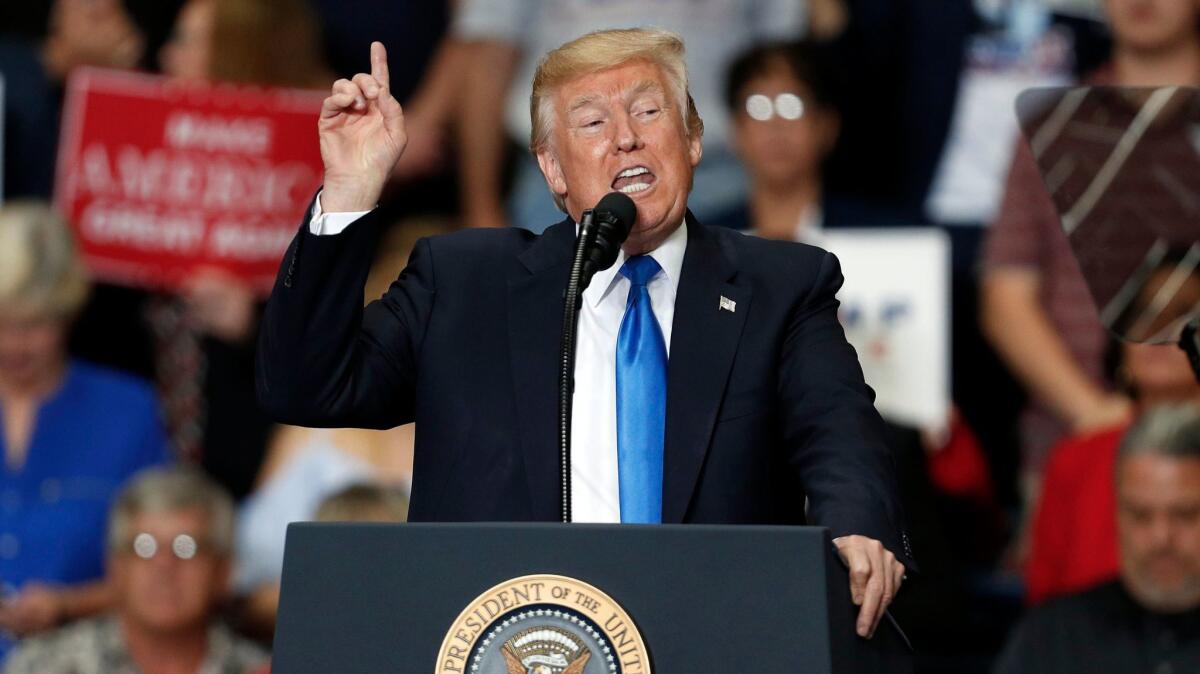Op-Ed: Trump’s move to end DACA has roots in America’s long, shameful history of eugenics

- Share via
In announcing President Trump’s decision to roll back the Deferred Action for Childhood Arrivals program, Atty. Gen. Jeff Sessions cited the safety and jobs of American citizens and the need for a “system of immigration that serves the national interest.” In the past, Sessions said, failing to enforce immigration laws has put the country at risk of “crime, violence and even terrorism.”
But the best data indicate that immigrants brought to the United States illegally as children, the so-called Dreamers, do not take jobs from citizens and commit far less crime than other groups. They also contribute billions of dollars to the economy every year.
There is another distinction that sets Dreamers apart, of course: Most of them are from Mexico, and they are not white. Trump’s move to end DACA, therefore, must be understood within the historical context of America’s exclusionary immigration policies, the bulk of which have relied on the pseudoscience of eugenics.
Beginning with the Chinese Exclusion Act of 1882, race-based immigration policies arose alongside eugenics, a form of social engineering that separated humanity into desirable and undesirable groups. Anglo-Saxons were placed atop the ranking of groups considered desirable, while the bottom rankings were occupied by Eastern and Southern Europeans, Asians, Africans and Native Americans. President Theodore Roosevelt was heavily influenced by eugenics and once remarked that the country needed “good breeders as well as good fighters.”
Over the years, Trump has demonstrated a fondness for eugenic principles, repeatedly promoting the view that genes make the man.
Eugenics informed American immigration policy most blatantly during the period between the world wars. IQ tests were employed as instruments of discrimination, used to identify who would be confined and even sterilized. The Immigration Act of 1924 excluded many Jews and Italians and nearly all Africans and Asians.
American experts even promoted eugenics abroad. In accepting an honor from the Nazi government in 1936, the American eugenicist Harry Laughlin praised Germany for having “nurtured the human seed-stock” of the United States.
After the Holocaust demonstrated the evil inherent in eugenics, the word faded from use, but application of the theory did not die. An Eisenhower administration policy called Operation Wetback targeted undocumented brown-skinned people in California for deportation in the 1950s, and many states fought to preserve discriminatory practices driven by eugenics, including Oregon, which continued to order forced sterilizations until 1981.
Over the years, Trump has demonstrated a fondness for eugenic principles, repeatedly promoting the view that genes make the man. “You have to be born lucky,” Trump told Oprah Winfrey in 1988, “in the sense that you have to have the right genes.” He later spoke of being a “gene believer,” declaring, “I have great genes, and all that stuff.” Others are not as blessed as he is, Trump has said: “Some people cannot, genetically, handle pressure.”
In an interview I conducted with Trump, he told me that he had a genetic “gift” for real estate. His son Donald put it more explicitly, explaining that his family subscribes to a “racehorse theory” that places a high value on human bloodlines.
Indeed, the elder Trump frequently refers to blood. “I’m proud to have that German blood. Great stuff,” he once said. More recently, in an interview with the New York Times, the president praised his granddaughter’s “good, smart genes.”
Trump’s extended circle displays a regard for genes that is unseemly at best and, at worst, dangerous. In March, Treasury Secretary Steve Mnuchin told a journalist, Mike Allen of Axios, that Trump’s “perfect genes” were responsible for his energy and health. When Allen asked for clarification, Mnuchin said, “He’s got perfect genes.” More troubling, Sessions earlier this year held up the Immigration Act of 1924 as an example of good policy.
One of Trump’s national security officials, Michael Anton, wrote an essay against immigration in which he argued: “‘Diversity’ is not ‘our strength;’ it’s a source of weakness, tension, and disunion.” Immigrants hurt the economy, Anton wrote, ignoring fact. True to eugenic orthodoxy, he insisted that communities are “de-Americanized” by immigrants.
It gets worse. Trump appointed Julie Kirchner to serve as ombudsman of the U.S. Citizenship and Immigration Services. Previously, Kirchner was the executive director of the Federation for American Immigration Reform — an anti-immigration group whose founder, John Tanton, espoused eugenic views. “Do we leave it to individuals to decide that they are the intelligent ones who should have more kids?” Tanton once wrote. “And more troublesome, what about the less intelligent, who logically should have less. Who is going to break the bad news to them?”
Eugenicists would argue that Trump and Tanton are merely applying science to human social problems. But science and history show that eugenics is just racism, dressed up in a suit and tie. Trump’s move against Dreamers is more of the same. Arguments about the economy and public safety do not justify the decision, but eugenics explains it.
Michael D’Antonio is a Pulitzer Prize-winning reporter and the author of “The Truth About Trump.”
Follow the Opinion section on Twitter @latimesopinion or Facebook
More to Read
A cure for the common opinion
Get thought-provoking perspectives with our weekly newsletter.
You may occasionally receive promotional content from the Los Angeles Times.










